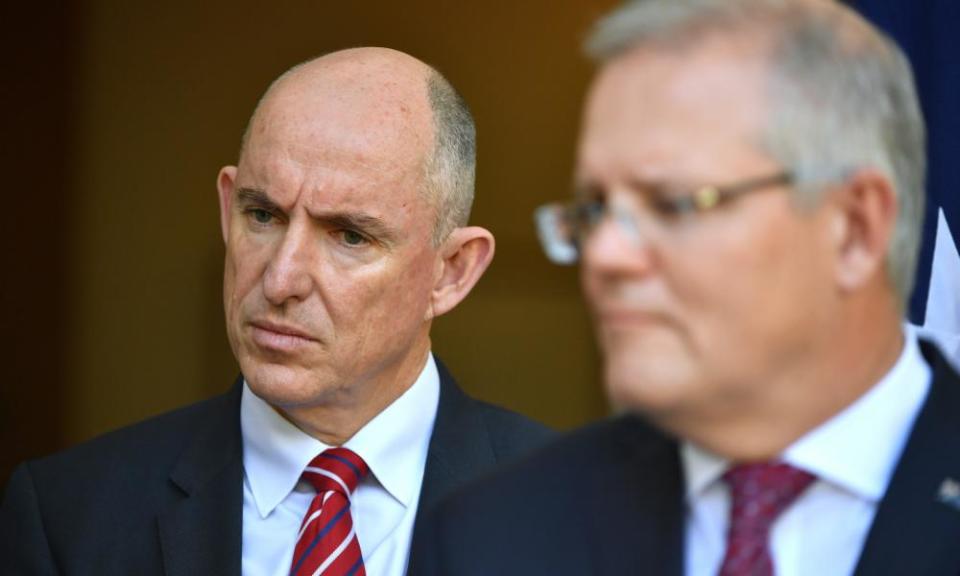Robodebt victims forced to wait for refunds from unlawful Centrelink debts

Thousands of robodebt victims will be kept waiting on refunds the federal government said it would start processing from 1 July, while those owed “larger” amounts after receiving an unlawful Centrelink debt will receive their money back in “instalments”.
In a backdown announced in May, the government services minister, Stuart Robert, said Services Australia would pay “some 190,000 [people] from 1 July”, while the agency would seek to get in touch with the remainder of the 373,000 people it says are eligible for refunds.
But in a statement published on Wednesday, Services Australia said only a “small number of refunds” would be made in “early July” to test the refund system, while “refunds will then be made from late July, with most expected to be paid by the end of November this year”.
Related: Labor calls for royal commission into Coalition's robodebt scheme
“Refunds will include repayment of any recovery fees and interest charges that we applied to your eligible debt,” the statement said. “If your refund is a larger amount, it will be paid in instalments.”
Now that the government has conceded the money was unlawfully obtained from welfare recipients, the increasing delays have been a source of frustration among critics, including Labor, the Greens and Gordon Legal, the firm challenging the scheme through a class action.
Andrew Grech, a partner at Gordon Legal, told Guardian Australia it was “outrageous” the government would pay back the larger refunds in instalments.
“What’s happening here is the government has admitted it is unlawfully holding the money of other people, it shouldn’t take the position it gets to decide how and when it pays it back,” he said.
“It seems outrageous to me, being the Commonwealth, they would want to pay it back in instalments. We’re not talking about millions dollars per claimant.
“For most of these claimants, the average amount is around $1,500-$2,000 and it seems preposterous that the Commonwealth would need to do that in instalments.”
On Wednesday morning, Guardian Australia approached the agency for comment about whether refunds would begin from 1 July on Wednesday. The agency published a statement on its website and did not respond to the Guardian.
A spokeswoman declined to answer questions on how many refunds would be issued this month, or why the money would not be paid from 1 July, as announced by Robert in May. She did not immediately have any details on how the refunds would be paid when delivered in “instalments”.
In the statement on its website, Services Australia said people who are currently receiving Centrelink payments and were eligible for a refund would receive a notification on their online account within five business days once the refund was processed.
Those who are not receiving benefits would have to update their details with the agency from “late July”, the statement said.
People would receive a letter confirming the refund amount, the agency said.
“We’ll write to you if you’re eligible for a refund from mid-July,” it said. “In cases where no money has been paid towards an eligible debt, that debt will be reduced to zero.”
Labor’s government services spokesman, Bill Shorten, said Robert had “once again” misled the public on robodebt, “this time reneging on a promise to repay money illegally taken from them”.
“He previously said 190,000 Australians would be repaid from today but that has now been dramatically reduced to ‘a small number in July’,” Shorten said. “They are clearly stalling for time, treating robodebt victims like idiots.”
The government’s robodebt program issued at least 470,000 unlawful debts to welfare recipients from 2015 using a flawed method known as “income averaging”. The government has only committed to repaying debts raised in this fashion.
The program is currently the subject of a class action in the federal courtwhich argues that about 600,000 debts should be refunded, including those initially raised using this method but later substantiated using other evidence, such as payslips. The total value of all debts raised through the scheme is about $2bn.
Related: Robodebt victims could face second round of pain – tax bills on refunds
Gordon Legal has argued the court should have oversight over the refunds process.
Guardian Australia revealed last month the government’s proactive decision to proactively announce refunds while the case was ongoing was in part aimed at discouraging people to take part in the class action, which is also seeking compensation and interest payment.
Amid concerns over the tax treatment of refunds, the agency also confirmed robodebt refunds would not be taxable income and that recipients would not need to rectify past tax returns in anyway.
A spokesman for Robert said the minister had been consistent, pointing the Guardian to a press release that said the refunds would begin from July.

 Yahoo Finance
Yahoo Finance 